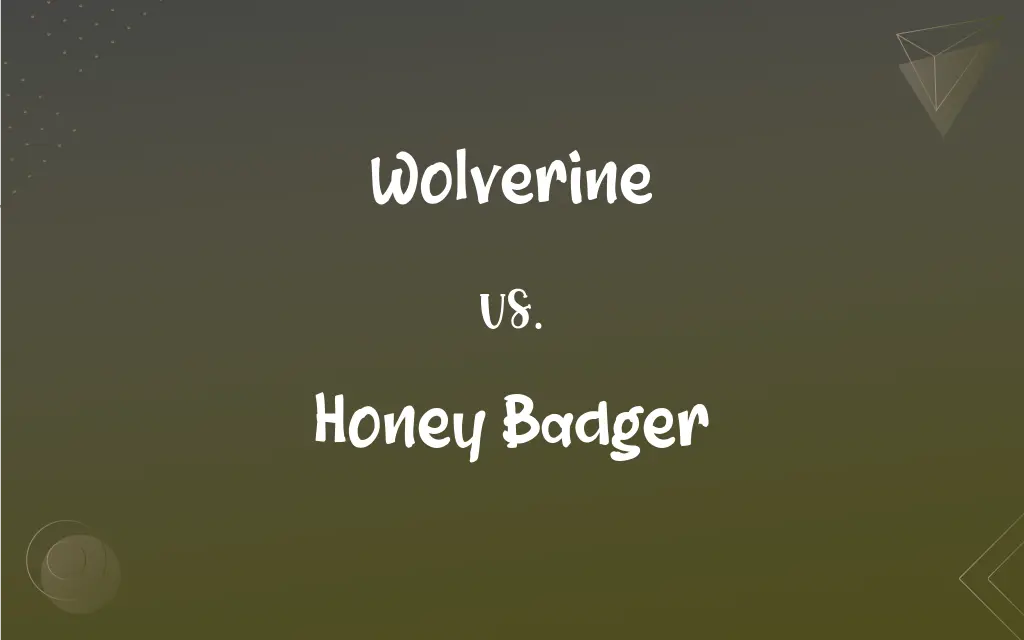Wolverine vs. Honey Badger: What's the Difference?
Edited by Harlon Moss || By Janet White || Published on October 17, 2023
Wolverine is a large, muscular mammal known for its strength and ferocity, whereas the honey badger is smaller but equally fierce, renowned for its toughness and fearless nature.

Key Differences
The Wolverine, a creature primarily found in remote reaches of the Northern hemisphere, sports a thick, dark, and glossy fur, a stark contrast to the Honey Badger’s grayish-black and white fur that artfully covers its robust body. Both animals belong to the Mustelidae family but inhabit strikingly different geographical areas. Wolverines traverse cold and harsh environments, often displaying a capability to adapt to sub-zero temperatures. Honey Badgers, in contrast, adeptly navigate through varied environments, from forests and grasslands to deserts, exhibiting great flexibility in habitat preference.
Wolverines exhibit a rather large and bear-like physique, coupled with a sturdy tail and a somewhat rounded head, leading them to be mistaken for a small bear at times. On the contrary, the Honey Badger possesses a distinctly long body and a comparatively short, bushy tail. While Wolverines manage to attain a reputation of being daring and powerful for their size, the Honey Badger takes it a notch higher, being renowned as one of the most fearless animals in the world. Both creatures, notwithstanding their size, do not shy away from confronting larger predators when threatened.
The dietary habits of Wolverines primarily involve preying on smaller mammals and scavenging carcasses in their frosty habitats. The Honey Badger, on the other hand, enjoys a diverse diet, encompassing insects, frogs, tortoises, and even venomous snakes, showcasing an impressive immunity to certain snake venoms. Wolverines demonstrate an incredible strength and ferocity, especially when safeguarding their food from other predators. Similarly, Honey Badgers, with their notorious courage, do not hesitate to safeguard their food and territory against much larger animals.
Regarding their social and reproductive habits, Wolverines tend to be solitary animals, coming together mainly for mating purposes. They are known for their roaming tendencies, covering vast territories to find food. Honey Badgers also exhibit a relatively solitary nature, although their social structures can occasionally accommodate cooperative living. Both animals demonstrate a noticeable fierceness in protecting their young and an impressive parental investment in raising them.
Comparison Chart
Taxonomic Family
Mustelidae (same family as otters and weasels)
Mustelidae (same family as otters and weasels)
ADVERTISEMENT
Size
Roughly 65 to 107 cm in length
Roughly 60 to 70 cm in length
Distribution
Northern boreal forests, subarctic and alpine tundra
Africa, the Middle East, and Indian subcontinent
Behavioral Trait
Solitary and territorial
Solitary and known for its fearlessness
Cultural Significance
Associated with the X-Men comics and films
Often touted as the world's most fearless animal
Wolverine and Honey Badger Definitions
Wolverine
An individual affiliated with the University of Michigan.
The Wolverines celebrated their victory over the rival team.
ADVERTISEMENT
Honey Badger
A pattern of behavior that shows little regard for potential dangers.
He went full honey badger and confronted the bully.
Wolverine
A resident of the U.S. state of Michigan.
As a Wolverine, she takes great pride in her Michigan heritage.
Honey Badger
An individual with a stubborn determination.
With a honey badger spirit, she pursued her dreams no matter the obstacles.
Wolverine
A solitary, carnivorous mammal known for its strength and ferocity.
The wolverine is often referred to as the hyena of the north.
Honey Badger
A meme originating from a viral video describing the animal's fearless behavior.
The phrase Honey badger don't care became an internet sensation.
Wolverine
A character from Marvel Comics, known for his adamantium claws and healing factor.
Wolverine is a central figure in the X-Men series.
Honey Badger
A term used to describe someone who is tough and relentless.
Even though she was outnumbered, her honey badger attitude prevailed.
Wolverine
A person known for their tenacity and resilience.
In the face of adversity, he proved to be a true wolverine.
Honey Badger
A small, carnivorous mammal known for its fearlessness and thick skin.
The honey badger is reputed to be one of the most fearless animals in the world.
Wolverine
A solitary mustelid mammal (Gulo gulo) of northern regions, having a heavyset body, short legs, dark fur, and a bushy tail, and known for its aggressive predatory behavior. Also called carcajou, glutton, skunk bear.
Wolverine
A solitary, fierce mammal of the Mustelidae family, species.
Wolverine
A resident of Michigan
Wolverine
Wolverine of northern Eurasia
Wolverine
Stocky shaggy-coated North American carnivorous mammal
FAQs
Is the wolverine related to wolves?
No, despite its name, the wolverine is not related to wolves and is actually part of the weasel family.
Where can you find wolverines in the wild?
Wolverines are found in northern boreal forests, subarctic, and alpine tundra regions.
Are honey badgers and wolverines the same animal?
No, while both are in the Mustelidae family, they are distinct species with different behaviors and habitats.
Is Wolverine a real animal or just a comic character?
Wolverine is both a real animal and a popular comic book character from Marvel Comics.
Where do honey badgers live?
They are found in Africa, the Middle East, and the Indian subcontinent.
Why is the honey badger considered so fearless?
Honey badgers are known to confront larger predators and have tough skin which makes it hard for predators to harm them.
Can a honey badger defeat a lion?
While a honey badger is fearless and can defend itself, it's unlikely to defeat a lion in direct combat.
Do honey badgers have any predators?
While they are fearless and can deter many potential threats, lions, leopards, and hyenas can be predators of honey badgers.
Are wolverines endangered?
Wolverines are not globally endangered, but their populations in certain regions are under threat due to habitat loss and climate change.
What do wolverines eat?
Wolverines are omnivores and eat a variety of foods, including small mammals, birds, insects, and berries.
Are honey badgers venomous?
No, honey badgers are not venomous, but they are resistant to certain snake venoms.
Are wolverines found in any other continents besides North America?
Yes, wolverines are also found in Europe and Asia.
How did the state of Michigan get the nickname "The Wolverine State"?
The origin is unclear, but it's believed to be either due to the state's history in the fur trade or a nickname given during a border dispute.
Can wolverines climb trees?
Yes, wolverines are skilled climbers and can climb trees to escape threats or seek food.
Do honey badgers hibernate?
No, honey badgers do not hibernate, but they can go into torpor, a short-term state of reduced activity, during cooler periods.
Why are wolverines often compared to hyenas?
Because of their similar feeding habits, often scavenging, and their strong jaws.
Are honey badgers good pets?
No, due to their aggressive and unpredictable nature, honey badgers are not recommended as pets.
What's the lifespan of a honey badger?
In the wild, honey badgers can live up to 8 years, but in captivity, they may live up to 14 years.
How big can a wolverine get?
Adult wolverines can weigh between 20 to 55 pounds, with males being larger than females.
What's the significance of the honey badger in indigenous cultures?
In some African cultures, the honey badger is admired for its courage and is seen as a symbol of tenacity and determination.
About Author
Written by
Janet WhiteJanet White has been an esteemed writer and blogger for Difference Wiki. Holding a Master's degree in Science and Medical Journalism from the prestigious Boston University, she has consistently demonstrated her expertise and passion for her field. When she's not immersed in her work, Janet relishes her time exercising, delving into a good book, and cherishing moments with friends and family.
Edited by
Harlon MossHarlon is a seasoned quality moderator and accomplished content writer for Difference Wiki. An alumnus of the prestigious University of California, he earned his degree in Computer Science. Leveraging his academic background, Harlon brings a meticulous and informed perspective to his work, ensuring content accuracy and excellence.








































































